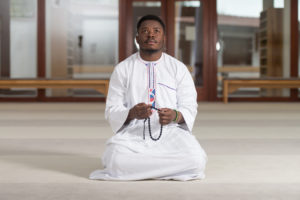 The socioeconomic, religious, and political landscapes of the United States have never been static. Our nation’s history is inexplicably tied with colonialism and slavery, but some narratives overlook how the involvement of both free and enslaved people of African ancestry shaped that history. With modern thinkers drawing connections between Islamophobia and racism, it’s important to examine the legacy and stories of black Islam in the United States.
The socioeconomic, religious, and political landscapes of the United States have never been static. Our nation’s history is inexplicably tied with colonialism and slavery, but some narratives overlook how the involvement of both free and enslaved people of African ancestry shaped that history. With modern thinkers drawing connections between Islamophobia and racism, it’s important to examine the legacy and stories of black Islam in the United States.
Black Islam in Early American History
The National Museum of African-American History and Culture discusses the ways in which African Muslims impacted early American history. One notable example is Mustafa Zemmouri, a man who spent a large chunk of his life enslaved by Spanish conquistadors. Known commonly as Estevanico or Esteban de Dorantes, his accomplishments include exploring the southeastern United States and New Mexico. African Muslims also fought alongside other colonists in the Revolutionary War, as evidenced by their surnames appearing on military rolls of the period.
During slavery, African Muslims banded together through a common language and their faith. Those literate in Arabic sent letters to other enslaved Muslims, wrote diaries and autobiographical accounts, and gifted elaborately penned documents to slaveholders and their associates. Since the recipients could not read Arabic, they didn’t realize that the text contained verses from the Quran that spoke against slavery, offered genealogical documentation, or admitted desires to return to Africa. Others used their intellectual and vocational training to learn American business practices, gain valuable resources, and eventually earn their way to freedom.
Malcolm X and the Nation of Islam
The Nation of Islam was founded in 1930 by Wallace Fard Muhammad, a man claiming to be the reincarnation of the original founder of the Moorish Science Temple of America. His original assistant, Elijah Poole, renamed himself Elijah Muhammad and became its next leader. Although Elijah Muhammad integrated mainstream Islamic beliefs such as specific prayer practices and the avoidance of alcohol, tobacco, and pork into its ideology, he also added several other teachings:
- The need to create a sovereign black-ruled nation
- Economic self-sufficiency of black communities
- Encouragement of followers to exchange their birth names for Arabic ones or adopt “X” as a surname to signify a missing, unknown African family name
Malcolm Little, who later changed his name to Malcom X, originally converted to Islam and joined the Nation while he was incarcerated, but he rapidly became one of the organization’s most vocal and prominent leaders after his release. Nevertheless, the Encyclopedia Britannica explains that his remarks about President John F. Kennedy’s assassination led to conflict with Elijah Muhammed. During his pilgrimage to Mecca, he turned away from the Nation’s ideology and embraced Sunni Islam instead.
Modern Demographics of Black American Muslims
As the Pew Research Center divulged in a July 2017 report, the followers of black Islam collectively comprise around 20 percent of the United States’ Muslim population. While recent African immigrants have shifted the demographic makeup of these communities, more than half of all American-born Muslims surveyed by Pew indicated that they identified as black. Specifically, 13 percent of the total black Muslim community in the United States are American-born individuals, while a little over 6 percent hail from countries in sub-Saharan Africa. Pew also clarifies that 45 percent follow Sunni Islam, which recognizes the first four caliphs as Muhammad’s legitimate successors.
Despite the Nation of Islam’s prominence during the mid-to-late 20th century, Pew discloses that only 3 percent of the black American Muslim community currently observe its teachings. Nevertheless, an April 2018 NPR broadcast reveals that the message of self-determination remains of critical importance, especially for contemporary American-born devotees. Meanwhile, black Muslim immigrants strive to create a new life in the United States. As both groups encounter racism and Islamophobia, they continue to look forward, forging communities and defining themselves on their terms.

